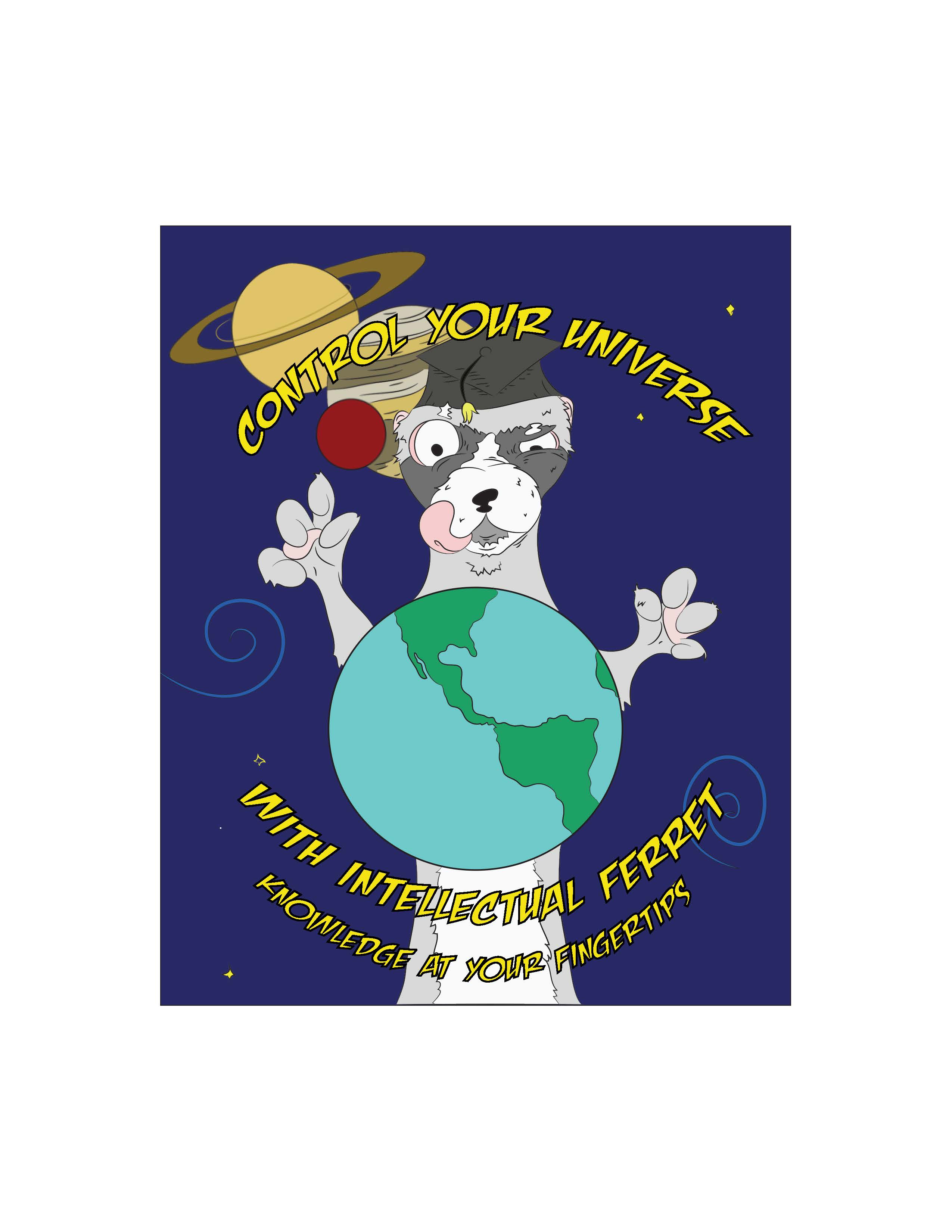New Poster!
At Intellectual Ferret, we believe wholeheartedly at becoming a platform for education across multiple disciplines.
As such, we commissioned a local artist, Cason Miller, to create a poster. Using his personal style to show an out-of-this world approach to education, Cason has developed a poster that presents a nontraditional, but still awesome, Intellectual Ferret.

Share the poster with your friends, coworkers, and the world.
Remember- at Intellectual Ferret you have knowledge at your fingertips.
If you are interested in contacting Cason, please visit his Facebook page!
Why Continuing Education Matters
by Connor Dillon
So you’ve just gotten a degree, maybe you have a job or two lined up (or more likely don’t). Time to start your life!
Except, you probably haven’t thought about this: all those skills you’ve developed and have ingrained in the back of your mind over the last seventeen years of formal education, well, they aren’t going to stay as bright and shiny as they are now.
In fact, you’re probably going to lose a couple of the skills you have and you’ll most likely forget most of the things the professors and teachers taught you.
Essentially, you’re fighting against a continuing degradation of knowledge and skills.
That’s partially why medical professionals like nurses, doctors, and such are required by law to get a certain number of professional development or continuing education hours from certified lectures, courses, or events. Of course, in that example you have to take into consideration that our knowledge of medicine advances quickly these days and no one wants a dentist who still does surgeries.
But several studies show that the knowledge you gain during an education or training event will likely be gone between three to eight months after it occurs. Obviously, directly after the course or lecture most individuals have a greater understanding of the subject matter. Their scores improved from their pre-training scores. After several months, however, their scores drop back down to where they were before!
From that alone we can say that the education you’ve received, well, it’ll really only “stick” with you from several months. The technical skills you can obviously practice and maintain, but that knowledge? In one ear and out the other.
In the interest of not just being technically skilled but knowledgable about your profession, you should continue to pursue educational opportunities. The best part is they don’t even have to be a formal thing! Go to your library and learn to paint, follow YouTube videos and carve wood, or if you have to chance to go to a conference, show up!
But if you don’t care to maintain and improve your knowledge and understanding of a subject, think about the increased chance of a pay raise or promotion..
That’s right- independent research commissioned by EvoLLLution surveyed 200 employers across North America in companies of varying size. The core questions they asked were:
- What do employees need to get ahead?
- How are employees rewarded or otherwise compensated for their education efforts?
- How does employee learning affect the company and the larger society?
And how did the employers respond?
A huge amount of them believe that employees need continuing education just to keep up with the job. Additionally, employers saw a positive impact in job performance while employees went through ongoing education- and how did they return the favor? “78% of employers said ongoing education has a positive impact on career advancement.” Want to hear an even better number? “…87% [of employers] said educational attainment positively affects compensation and salary.”
Wow. When a large majority of employers say such things, you should really sit up and take notice.
At the end of the day, continuing education doesn’t just help you become a better member of your profession; it can significantly increase your position in the company and your compensation for the work you do.
Wish You Were Here
Whenever I think of change, I think of this Pink Floyd song- particularly the lines “And did they get you to trade / Your heroes for ghosts? / Hot ashes for trees? / Hot air for a cool breeze? / Cold comfort for change? / And did you exchange / A walk on part in the war / For a lead role in a cage?”
Change is always uncomfortable. The very thought of doing something different is anesthetizing to most of us, causing us to stumble forward in hopes that the road we’re on will take us somewhere that’s halfway decent. All those dreams we had as children were destroyed long ago by the industrialized educational programs in this country that trained the “Why?” out of us, and with the “Why?” went the “Why not?” and all sense that we could do something different, that our dreams were worth holding on to.
The momentum required to overcome this inertia is ginormous! We aren’t inspired to change by money (it’s only temporary), by accolades (it’s even more temporary), or by our own economic survival. What I think, and I may be wrong, is that we are inspired to change when something deep down inside us sparks those childhood dreams. You know, the ones where you were the hero that saved everyone, where you were brave, strong, held to your values like a rock in spite of the odds against you, and came out on top because the good guys always win in the end.
That tiny, glowing ember of a burnt dream bursts into a flame when you find your destiny, that task you were designed for, that purpose for your life that you are compelled to pursue with passion. This is what fuels the momentum to carry us passed the point of no return, to stand on our hind legs like people and shout at the universe “I will succeed!”
Even though we know the odds are against us, we know that we will make it. We know that nothing will stop us- not because we are so great at what we do, but because we simply won’t give up. And it’s not that we don’t recognize the dangerous world we walk in- we see those dangers, but we are no longer cowed by fear into inaction.
One question I ask my business consulting clients is “If it were absolutely impossible for you to fail, what would you be doing with your life?”
All too often, the answer I get is something completely unrelated to what they are doing now. Why? Because they are afraid to step out and risk everything in pursuit of their dreams.
I’m convinced that 98% of success is just showing up and not quitting. The other 2% is learned behavior.
I remember one Building America research project I worked on. The local HVAC contractor was asked to install a high performance duct system designed by a colleague of mine from Florida, Dennis Stroer. About 4 months after the job was completed, I ran into Hector at another client’s office.
“Hector, how did that duct system work out? Was it less expensive to install?” “Yes.”, he replied.
“Was it faster to install?” “Yes.”, he replied.
“We know it performs better because we’ve tested it- so it’s less expensive, faster, and performs better?” “Yes.” he replied.
“So you’re going to put it in that way in all your homes from now on?” “No.” he replied, “It’s different, so we didn’t like it.”
Fear of change is costing that HVAC company thousands of dollars every year, the builders they work for thousands of dollars in unnecessary expenses, and the homeowners who have to live with crappy HVAC systems thousands of dollars over their tenure in the home. All because they are afraid to change.
Meaningful Life
I read Creativity by Mihaly Csikszentmihaly, trying to gain insight, when I stumbled across two quotes that rocked me.
The first is from Erik Erikson: “I am what survives me.” This simple, yet powerful phrase describing identity should be painted above every home’s entry door- on both sides- reminding us as we leave and return what is important.
The second was from Jonas Salk, slightly paraphrased here: “Be a good ancestor.” This is the perfect description of sustainability! What will our future generations inherit from us? Is it going to have value, a worth more than the cost?
Whenever I do work, I try to keep this idea in my mind, lurking in the background ready to pounce upon my conscience should I violate one of my core value creation principles: “Is what I’m doing creating value and generating a positive influence that will be part of my legacy?”
What is Possible?
What is Possible?
I have an imagination and I’m not afraid to use it. I had an employee give me a button to wear with that on it- and I wore it every day at that workplace.
When I was much younger, relatives called me “Spock” because I would comment on human behavior with “That’s just not logical!” I was taught from an early age to use declarative reasoning based on deductive and inductive logic to figure out what was likely true or false.
Deductive logic builds boxes or frameworks that allow us to separate or differentiate bits of knowledge- we can identify mammals by certain characteristics, then we can fit animals into the mammal box depending on whether they fit those characteristics.
Inductive logic creates general rules based on observation and experience, and draws conclusions leading us to what we believe is true or not. Pressing my foot on the vertical pedal on the floor of the Driver’s position of the car makes my car engine work more- and if I do that while the gearbox is in Drive mode, the car goes faster, but if I do that in park mode, the car doesn’t move at all. I can induce that there is a mechanism involved that disconnects the engine from the wheels when in park, and locks the wheels in position. In neutral, the mechanism disconnects the engine from the wheels, but the wheels are not locked in place.
Using both types of logic is necessary for us to discover what is likely true or not- but they don’t help us figure out what is possible! Only modal reasoning with the addition of abductive logic can help us.
Abductive logic looks for the best explanation that fits the data that doesn’t fit our current model. This creates a new, better model for us to work with. Abductive logic looks for what is possible and frees us from the chains of what we think is the only way. We create experiments to disprove what is possible, with a consequence of rich results that suddenly provide us with a bunch of never-before considered options.
To find what is possible, look for stuff that doesn’t fit into our differentiated boxes- these insights will help us form a new and better model. Then, experiment to disprove. An amazing thing will happen- you’ll learn that the universe doesn’t fall apart when you try something different.
You Are Capable
Think of all the complex tasks you do everyday. Driving cars, playing musical instruments, the very act of handwriting- these are very complex activities.
Take teeth brushing, for instance. Somehow you have to maneuver your meat-covered skeleton made from stardust into a space where you have access to water, a teeth brush, and teeth paste to scrub your teeth. You have to manipulate the cap off the tube of teeth paste and squeeze the right amount out – not too much nor too little- onto the bristles of your teeth brush. If you are a civilized person, you’ll put the cap back on and then insert the teeth paste-covered bristles into your open mouth between your lips and cheeks and your teeth, scrubbing vigorously up and down. Then the tops of your teeth and finally the inside surfaces of your teeth. After a rinse if mouth and brush, you’re done! But how many steps did it take you?
If you’re like most people, you don’t even think about it. One person I know even cleans his ears while engaged in teeth brushing! It has become automatic behavior, a habit, that doesn’t require conscious thought anymore- but once, it did.
Reflecting on your thinking is no more complex that brushing your teeth, yet it seems so difficult for most people. Why?
To begin with, we have our curiosity trained out of us by the educational institutions we were processed through as children. Then, we are taught at institutions of higher learning to memorize everything we can about specific subjects so we can regurgitate information on demand. Then we go to work for businesses that prescribe what we do during the time they rent from us, often in infuriating detail. At no time are we taught how to think and how to reflect on our thinking- those skills are now deemed unnecessary as the manager or leader does that as part of their job.
The result? At least three generations, probably more, of people who cannot think for themselves, figure things out, who think that everything on the internet is true (“Bon jour!”). If you were bothered by my use of the phrase “teeth brush” instead of the more conventional “toothbrush”, you might be part of that group to some degree.
To gain experience and confidence in your capability to deal with complexity, you will need self-discipline to turn the following exercise into a habit.
Start with an outcome or result of a decision you’ve made. Write it down. Next, think of all the actions you and others involved in that outcome took. Write them down. Now reflect on the thinking that led you to choose that action over other options. Write your description of the thought process down.
What you’ll likely find is that we rarely make decisions that only involve us, and we give very little thought to the actions we take. We are simply drifting through life on automatic mode, reacting to external forces based on our values and experiences (which are shaped by those very forces) in a self-perpetuating cycle of mediocrity.
But you are capable of far greater things than that! You can take control of your life and shape it into a life of meaning and purpose- if you’ll stop to reflect on the fact that your view of the world is imperfect, that differing views hold the potential for insight, that a more complete view exists, that you are capable of finding more complete views by practicing critical thinking, and that you are capable of dealing with complexity by thinking backwards from outcome to action to thought.
A Good Trainer

A good trainer is a rare find because many Train the Trainer programs often focus on teaching the mechanics of how to do a certain task, or follow a prescriptive formula for a specific program. That’s not what Train the Trainer programs should be- instead, they should focus on teaching trainers the best ways to TEACH!
Who makes a good trainer candidate? My friend Darrel Tenter and I have been discussing this for a couple of years now, and I’m not sure we will come to a definitive agreement. I am in the “experience doing the job first” camp, and I think he’s in the “be able to teach well” camp.
I believe a good trainer needs at least 8 years of experience doing the work they will be teaching others- mostly because they need to have that kind of experience to support their position, to hold their own convictions when dealing with fuzzy thinking students, and to provide- in the minds of the students- the authority to teach. This is a teaching principle that is at least 2,000 years old. In the Bible, it is recorded that people were astonished at Jesus’ teaching “because, unlike the scribes, he was teaching them as one having authority.” The Greek word translated “authority” refers to his ability and strength of teaching- something that is best gained by experience.
The second requirement of a good trainer candidate is their maturity level. It is extremely difficult for immature people to be taken seriously as any kind of authority figure. They lack the chops that earn the respect of the students and learning transfer will suffer.
The third quality I want to see in a good trainer candidate is the ability to teach. But isn’t that why they attend Train the Trainer courses? Perhaps ability isn’t the right word- perhaps it is more a combination of empathy, humility, compassion, communication skills, and attitude. If the trainer candidate has those qualities, they will do well in a proper Train the Trainer course where they will learn the skills required to become a good trainer.
Once a trainer candidate enters my Train the Trainer workshop, I have a singular goal: help them transform into a good trainer, the best instructor they can be.
A good trainer is someone who knows how to do a job, but isn’t paid for that- they are paid for imparting that knowledge and wisdom into others, creating a productive worker. In order to do that, they really need to know the kind of work they are training people to do. A good trainer also works from a planned course of instruction that teaches all the operations of the trade or craft in a way that allows the student to get it as quickly and easily as possible. This is the cornerstone of effective instruction.
Finally, a good trainer knows and understands the principles and methods of the training profession and how to apply them effectively. But they don’t just know the mechanics of teaching- they understand the psychological theory and evidence that underpins the instructional methods they practice.
My goal is to train the trainers who will become practitioners, not theorists, who will generate enthusiastic, productive people doing meaningful work.
Failure is an Option
“If you don’t turn in your homework, you will fail this class.”
“If you don’t pass this test, you will fail and be held back.”
“If you don’t go to school, you won’t get a good job.”
Early on we are taught that failure is not an option. Failure means that you are unintelligent, weak, and will never succeed at life.
However, without failure, there is no success.
It sucks to fail. I know that. I’ve failed a lot, and big, and I know the feeling. But this is a part of life and ultimately a part of success.
You learn from mistakes and from your failures. It could just be you learn not to put a fork in an electrical socket. It could be that you learn more about yourself as a person. The lessons range in scale, but each one of them is necessary.
So why is it that when you are school failure is seen as such a bad thing? Because in the industrialized method of schooling, you are taught to do tasks as quickly and efficiently as possible. There is not any room for error on an assembly line because it costs time and money.
The key to failing is to learn quickly from your mistakes. You have to be quick on your feet and reassess the situation so that you can change your course of action and succeed.
I was working on a project in college and we had to put together a very short commercial over sex trafficking. Our group went into the project with an idea and went out a filmed a whole bunch of footage that we would then apply to interviews that were provided for us. When we sat down to edit everything together, it was a disaster. Nothing was working. It felt forced and it was just not working. And it was due the next day. I went to my professor and asked if we could have an extension because it was not working. She told me no. It was due tomorrow, no questions asked. I was so stressed I started crying. I didn’t want to turn in the project late. I felt like I was a failure because I couldn’t put together a 30 second video.
So what did I do? I pulled myself together, and we started over. We went back to the beginning, clean slate, and two hours later, the video was complete. And it was pretty dang good.
This failure was necessary because it taught us a lesson. Our professor intentionally gave us a small time-frame to complete the project. We learned to watch all of the footage we were given before coming up with a concept. Because that is what happened. We expected certain things to be in the interview footage and it wasn’t. So we spent a lot of time filming things that didn’t work when we could have already been done with the commercial.
It was stressful as hell. The experience sucked, but it was needed.
School needs to change how they convey. It puts a lot of pressure on a kid when they feel like the only way they will succeed is to have perfect grades, be picked first when in PE, and never fail. This has got to change, but life is full of failures. It’s how we learn.
So we need to be taught how to pick ourself up quickly when we do fail.
Without failure, there is no success.
Search
IMPORTANT UPDATE
As of January 1, 2023, The Dillon Group, Inc. is NOT a RESNET®-accredited Training Provider.

PLEASE NOTE: Any use of “RESNET®” or other registered trademarks by The Dillon Group, Inc. does not indicate ownership, sponsorship, or endorsement by the registered trademark owners. Any use of registered trademarks falls under informational, editorial, or comparative use.
